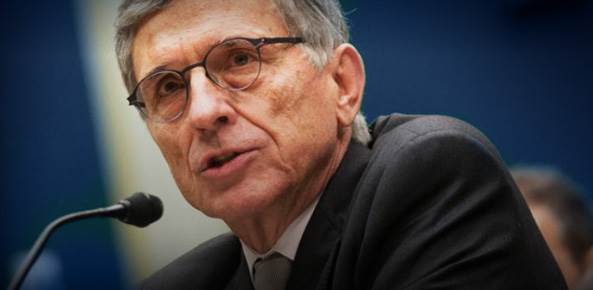Almost a year after federal concerns about a cable/broadband monopoly derailed a proposed merger between Comcast and Time Warner Cable (TWC), officials yesterday gave a conditional thumbs-up to a three-way marriage of TWC, Charter Communications and Bright House Networks.
Under the terms hammered out between the U.S. Department of Justice and the Federal Communications Commission (FCC), the newly merged company will be prohibited for seven years from charging premium interconnection fees to other broadcasters or online streaming services using its network. The proposed conditions also prevent the new company from imposing usage-based prices or data caps on customers over a seven-year period.
The conditions will “directly benefit consumers by bringing and protecting competition to the video marketplace and increasing broadband deployment,” FCC Chairman Tom Wheeler (pictured above) said in a statement. Although Wheeler supports the deal, the FCC has not yet formally approved it.
The deal has ensured “comprehensive relief” from concerns about potentially anti-competitive business practices by the newly merged company, Principal Deputy Assistant Attorney General Renata Hesse, who heads the Justice Department’s Antitrust Division, said in a separate statement. “We will work together to closely monitor compliance to ensure that New Charter will not have the power to choke off this important source of disruptive competition and deny consumers the benefits of innovation and new services,” she said.
$ 88.4 Billion, 3-Way Merger
Under the merger, Charter will take over TWC for $ 78 billion and spend another $ 10.4 billion to acquire Bright House from Advance/Newhouse Partnership. The resulting company, New Charter, would have more than 17 million video subscribers, becoming the second-largest cable company in the U.S. The new company would also be the third-largest multi-channel video programming distributor in the country, according to the Justice Department.
The open Internet advocacy group Free Press criticized the Justice/FCC proposal, saying it helps to create a new company that “would control nearly two-thirds of the nation’s high-speed Internet subscribers.”
“There’s nothing about this massive merger that serves the public interest,” Free Press president and CEO Craig Aaron said in a statement. “Thanks to this merger both Charter and Comcast now have unprecedented control over our cable and Internet connections. Their crushing monopoly power will mean fewer choices, higher prices, no accountability and no competition. Conditions won’t lower the monthly bills for those who’ll be hit hardest by these rate hikes: low-income households and communities of color.”
California Regulators Still Have Say
The Internet trade group Incompas, on the other hand, expressed support for the deal enabling the Charter merger. “Americans want more broadband competition, not less,” said CEO Chip Pickering in response to the announcement. “On the surface, the emergence of a larger cable company is counter to those desires, but by imposing a seven-year, settlement-free interconnection condition, one of the longest and strongest interconnection terms in recent history, Chairman Wheeler is keeping a critical bridge to competition open.”
Both Charter and TWC issued statements yesterday saying they were confident the merger would be able to go forward after final regulatory approval.
As the Consumerist noted in an analysis, the merger still requires approval by public utility regulators in California, who were “particularly critical of the Comcast/TWC merger before it failed.” However, state-level concerns about the Charter deal will probably only lead to the imposing of additional conditions before the merger is allowed to go through, the Consumerist noted.
Image Credit: FCC.







